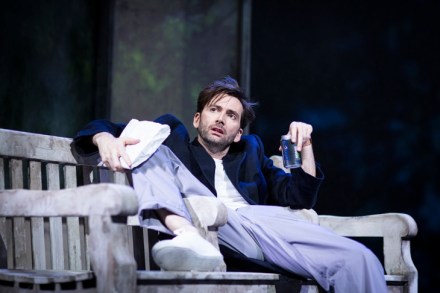Kill the DJ
Don Juan in Soho rehashes an old Spanish yarn about a sexual glutton ruined by his appetite. Setting the story in modern London puts a strain on today’s play-goer, who tends to regard excessive promiscuity as a disease rather than a glamorous adventure. And the central character, a vulgar aristocrat named DJ who grades everyone on a scale of ‘fuckability’, contravenes the sentimental egalitarianism of our current sexual code. Writer Patrick Marber offers us a version of London where the social structure of the Regency still endures. Educated Englishmen are the only fully evolved human beings. Beneath them swarms an amusing underclass of thick, greedy motormouths from whom the Englishman





















